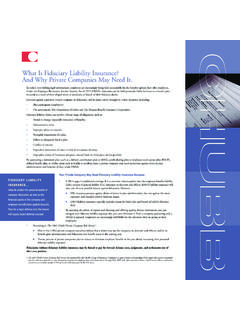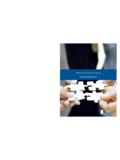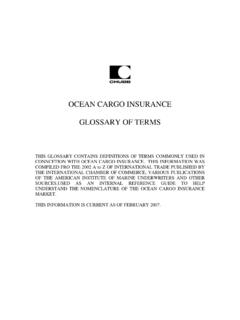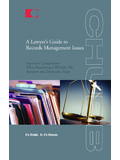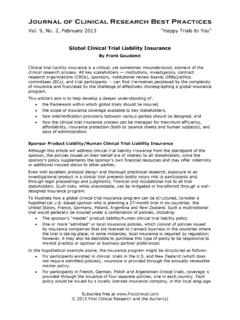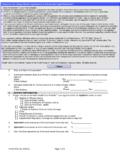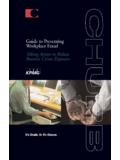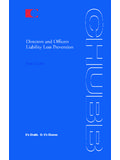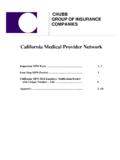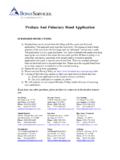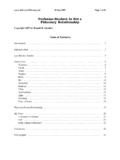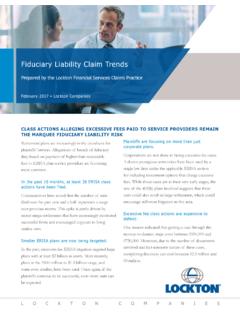Transcription of Fiduciary Liability Loss Prevention - Chubb
1 Fiduciary Liability loss Prevention from Chubb It's Chubb . Or it's Chance. 2006 Chubb & Son, a division of Federal Insurance Company Fiduciary Liability . loss Prevention . Prepared by Dan A. Bailey Bailey Cavalieri LLC. For the Chubb Group of Insurance Companies Note: The views expressed herein are those of the author and may or may not reflect the views of any member of the Chubb Group of Insurance Companies. PREFACE. The Employee Retirement Income Security Act of 1974 (ERISA) ushered in a new world of Liability for fiduciaries of employee benefit plans. Since then, numerous amendments to ERISA and other laws governing Fiduciary conduct have continued to weave a complex and challenging environment in which to administer these plans.
2 Lawsuits are increasingly brought against fiduciaries, subjecting them to personal Liability as well as expensive, time- consuming legal proceedings. As a leading provider of Fiduciary Liability insurance, the Chubb Group of Insurance Companies believes that sound risk management practices can minimize exposure to litigation and enhance the performance and efficient administration of employee benefit programs. Chubb commissioned Dan A. Bailey, a partner in the law firm of Bailey Cavalieri LLC, to prepare Fiduciary Liability loss Prevention to help fiduciaries and their employers protect themselves from litigation arising from their professional duties. It discusses the general principles governing Fiduciary Liability , reviews many potential exposures, and suggests step-by- step loss Prevention procedures.
3 Although we believe this resource offers important guidance and can help fiduciaries of employee benefit plans and their companies develop effective loss Prevention strategies, it is not a substitute for prudent legal advice. We encourage the reader to seek advice from competent counsel for any specific issues that arise when designing and implementing loss Prevention procedures. 1. CONTENTS. Introduction ..5. General Principles Governing Fiduciary Liability ..7. Basic Fiduciary Duties Under ERISA ..7. What Is an Employee Benefit Plan? ..7. Who Is a Fiduciary ? ..8. Fiduciary Standards ..9. Prohibited Transactions ..10. Fiduciary Liability ..10. Most Common Types of Fiduciary Claims ..11. Selection of Fiduciaries ..12. Actions by Fiduciaries.
4 14. Education ..14. Thoughtful, Informed Decision Making ..14. Oversight Responsibilities ..15. Documentation and Observance of Formalities ..16. Delegation of Responsibility ..19. Fiduciary Delegation ..19. Support Services ..20. Use of Legal Counsel ..21. Conflicts of Interest ..22. loss Prevention Guidelines for Special Risks ..25. Stock-Drop Litigation ..25. Legal Compliance ..29. Participant Claims ..30. Tender Offers ..31. Employee Stock Ownership Plans (ESOPs) ..32. Labor-Management Plans ..33. Cash Balance Plan Conversions ..34. 3. Fees to Service Providers ..35. Blackout Periods ..36. Selection of Annuity Provider ..37. Maximizing Legal Protection ..39. Maximum Indemnification Protection ..39. Fidelity Bond ..40. Fiduciary Liability Insurance.
5 40. Administrative Remedies ..42. Document Retention Program ..42. Compliance Audit ..43. Voluntary Fiduciary Correction Program ..43. Participant-directed Individual Account Plans ..44. Avoiding de novo Standard of Review ..45. Conclusion ..46. About the Author ..47. INTRODUCTION. Prior to 1974, Fiduciary loss Prevention was relatively simple. Employee benefit plans typically contained an exculpatory provision that purported to relieve plan fiduciaries from Liability for wrongful acts. The enactment of ERISA eliminated this absolute protection. Although fiduciaries, their advisors, and the courts have given great attention to the meaning and effect of ERISA, only limited attention has been given to effective Fiduciary loss Prevention .
6 An effective Fiduciary loss Prevention program may accomplish numerous objectives: Reduce the Liability exposure of fiduciaries, as well as the sponsoring employer to the extent the employer may indemnify losses incurred by the fiduciaries. Enhance the performance and efficient administration of the plan. Avoid time-consuming, distracting, and potentially embarrassing claims and litigation. Enhance the defense of claims and reduce the potential recovery by a claimant. Improve the ability to obtain favorable Fiduciary Liability insurance coverage at reasonable cost. Improve employer-employee relations. The following discussion identifies various areas in which Fiduciary loss Prevention opportunities exist and should be considered.
7 Although some Fiduciary loss Prevention concepts may seem obvious, others may differ from historical practices. Fiduciaries may have difficulty objectively evaluating the necessity and appropriateness of some loss Prevention concepts, particularly 5. if they have not been the subject of a claim. Accordingly, outside consultants may be useful in evaluating, structuring, or implementing programs specifically tailored to a particular plan. 6. GENERAL PRINCIPLES GOVERNING. Fiduciary Liability . Basic Fiduciary Duties Under ERISA. ERISA regulates the conduct and duties of employee benefit plans, their fiduciaries, and other persons. The scope and effect of ERISA is not easily understood, and expert assistance is frequently required in interpreting and implementing ERISA provisions.
8 What follows is a simplified overview of employee benefit plan Fiduciary regulation by ERISA, subject to numerous qualifications and exceptions. In addition, various state statutes are preempted to the extent that they are inconsistent with ERISA. What Is an Employee Benefit Plan? ERISA broadly defines employee benefit plans that are subject to its regulation to include any plan, fund, or program established or maintained for the purpose of providing to its participants or beneficiaries employee benefits. Included within this definition are employee pension plans and employee welfare plans. Employee pension plans include pension, profit-sharing, and stock bonus plans that are qualified under the Internal Revenue Code of 1986, as well as certain nonqualified deferred compensation arrangements, such as top hat plans.
9 Employee welfare plans include plans, funds, and programs that provide medical, surgical, or hospital care; vision or dental benefits; benefits in the event of sickness, accident, disability, unemployment, or death; prepaid legal services; day-care centers; and educational assistance programs. While most employee benefit plans are documented, ERISA does not require a plan, fund, or program to be in writing or otherwise documented. ERISA has been interpreted broadly by courts to include very informal employment practices. ERISA, however, does not apply to benefits that are 7. paid from the general assets of the employer, such as sick pay, vacation pay, severance pay, and bonus programs. Careful structuring of certain employee benefit programs by knowledgeable ERISA experts can avoid inadvertent application of ERISA rules to programs and their administrators.
10 Who Is a Fiduciary ? ERISA takes a functional approach in defining who is a Fiduciary . For ERISA purposes, a Fiduciary is any person so named in the plan instrument or any person who exercises any discretionary authority or control with respect to the management or administration of the plan or its assets.. Fiduciaries are also individuals who render or have responsibility or authority to render investment advice for a fee or individuals who have discretionary authority or responsibility in the administration of a plan. Fiduciaries typically are plan sponsors, plan administrators, trustees, and investment managers, and they may also be other persons who have authority over any aspect of the plan or its assets. The definition of Fiduciary is deliberately broad in order to hold accountable all those individuals who may be responsible for misuse of plan assets or loss to plan participants.
